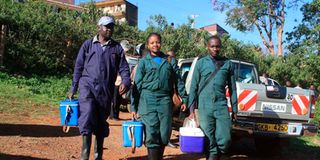Call in the veterinarians to aid in mitigating spread of coronavirus

Vets going to vaccinate livestock. Vets are mandated to handle, treat, immunise and conduct research on animals and this puts the profession in juxtaposition with human healthcare providers.
Recently, the World Health Organisation (WHO) sent a team to Wuhan, China, to investigate the origin of the novel coronavirus that has wreaked havoc in the world’s health systems. But it will be difficult to tell the origin of the disastrous pathogen as the WHO keeps ‘guessing’ what could have happened: First ruling out a laboratory leak and, secondly, suspecting importation of the virus in frozen meat.
That the Covid-19 pandemic started with the implication of bats and pangolins in the context of transmission of coronavirus to humans should have put veterinarians at the centre of the discourse. Although the suspicion of these animals’ involvement hasn’t been conclusive, more recent studies in laboratory settings indicate that infected cats, ferrets, fruit bats and hamsters may spread the disease to other animals of the same species.
Contact with animals
Some pets became ill after making contact with Covid-19-positive people. Confirmed infected persons have been advised to avoid contact with animals — including pets, livestock and wildlife. Vets are mandated to handle, treat, immunise and conduct research on animals and this puts the profession in juxtaposition with human healthcare providers.
The emergence of zoonotic diseases has been on an exponential trajectory due to habitat loss, climate change, closer human-animal interaction and increasing consumption of animal products not cleared for humans. The WHO and the World Organisation for Animal Health (OIE) are the international bodies mandated to guide human and animal health matters, respectively. Their long-standing relationship has been even more crystallised by the growing One Health principle for a better planetary health.
Synchronising research
But although the human medical arm has been active in research and treatment on human diseases, the joining chain of animal health to human medicine has been weak, making synchronising research in animal health with day-to-day human medicine at the policy level wishful thinking.
Most vets have been quite proactive in one health research, cognisant of what Kenya’s veterinary policy stipulates — that close to 75 per cent of emerging diseases affecting humans are caused by bacteria, viruses and other pathogens. These originate from animals and animal products as a result of improper handling of infected domestic and wild animals during production, at slaughter premises and in food markets.
Dealing with zoonotic diseases at the tail end of human medicine — that is, during hospitalisation and treatment — whereas on the other little is being done to support animal research is like fetching water from the river with a leaking bucket.
Covid-19 vaccination
The Covid-19 vaccination programme being rolled out by the State may not have full involvement of vets and this is a misstep. No researcher is permitted to handle bats, dogs, cats or livestock from a professional point without a vet’s supervision. Relegating vets to the far end as regards Covid-19 mitigation is a lack of comprehension of the holistic nature of dealing with animal-related pandemics.
The Ministry of Health ought to work closely with the State Department of Livestock to address the domestic cycle of disease transmission. The State Department of Wildlife, too, should research more on zoonotic diseases due to the sylvatic (jungle) cycle of transmission. This is possible only by strengthening the One Health aspect of research that helps to break the silo mentality and calls for a transdisciplinary system concept that connects human, animal and environmental health to tackle emerging diseases.
The environmental docket is also inextricably linked to One Health. Regardless of the extent in dealing with animal and human health, if the environment remains contaminated, then the disease cycles will never be broken and treatment and healthcare will be an expensive concern for the economy.
Should the WHO inform us someday that Covid-19 was, indeed, spilled from animals to humans, we shall all look at vets inquisitively and ask them difficult questions.
Mr Mutwiri, a doctoral student on zoonotic disease research, is an assistant lecturer at Kenya Methodist University (KeMU) School of Medicine. [email protected].





